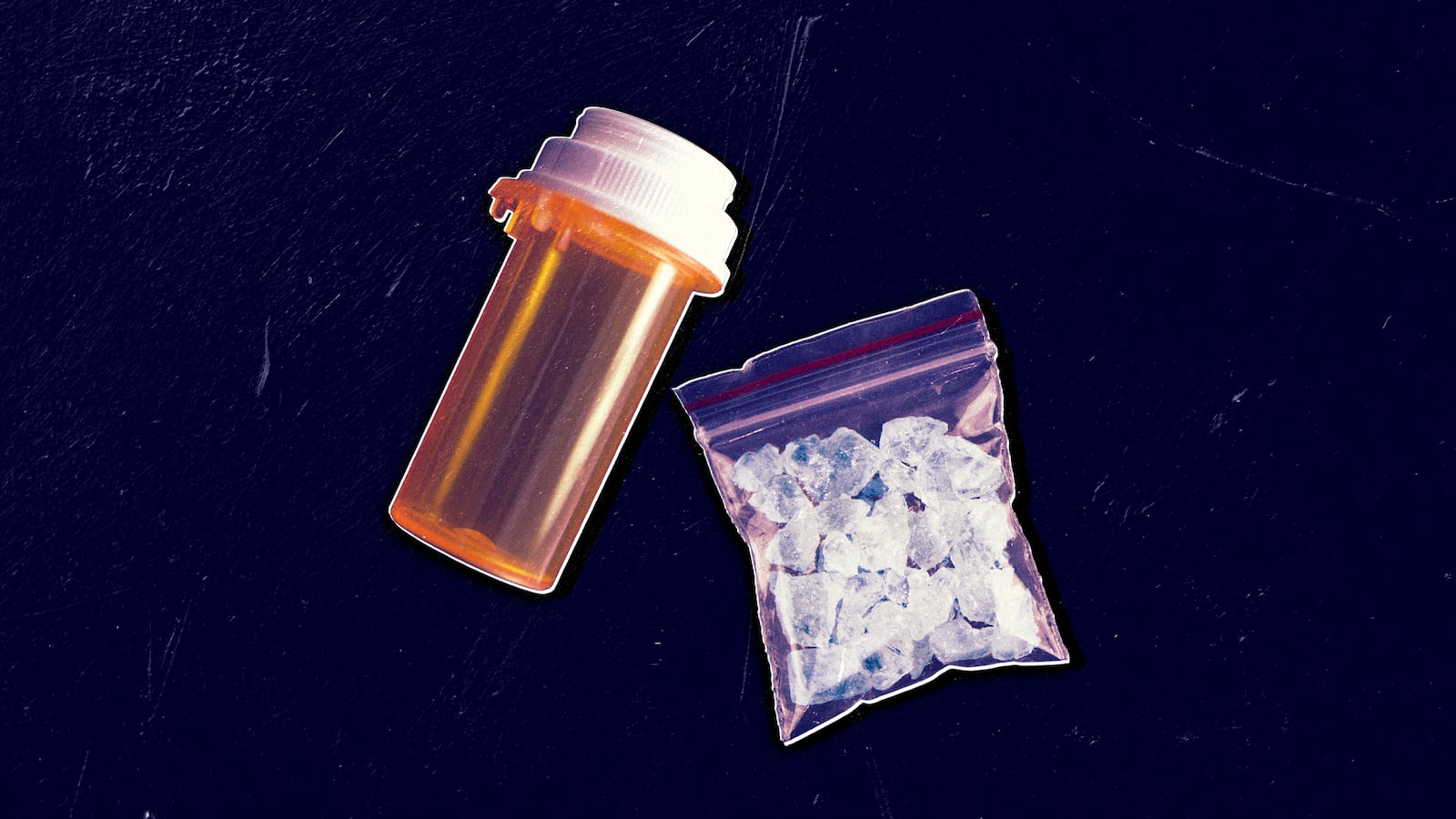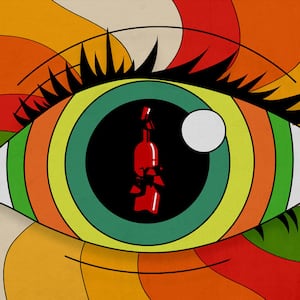Rita was an overachiever as a kid: Her school placed her in a gifted and talented program at 5, and she competed on the national level with her swim team starting in elementary school. But when she entered junior high school, she suddenly couldn’t focus. “Everything was boring,” Rita, whose name has been changed to protect her identity, told The Daily Beast. Years later, in the early 1990s, she dropped out of college and started bartending in Phoenix, Arizona. That’s when a coworker offered her meth—and everything changed.
When she tried it, Rita didn’t get high. Instead, for the first time in a very long time, she could focus. “All my problems were solved,” she recalled. “I felt like I did when I was a kid. Like I could do things again.”
She began using small amounts of meth daily and was quickly promoted to manager at the bar where she worked. “For the first time I was really excelling, and I felt that my parents were proud of me, which I’d always wanted them to be,” she said. But things quickly devolved again when police pulled her over for a traffic violation and found drugs in her car. She was arrested for possession. After that, she was in and out of jail for a year.
After years of turmoil, she finally found an explanation for her focus issues—and for why meth seemed to ease those symptoms. In the 2000s, with the help of newly-available search engines, she learned that people with ADHD react to the drug differently. At first, Rita was skeptical about the idea that she might have it; she was not a “hyper” person per se. But as she began to understand the different ADHD subtypes, things started to click. It took a long time to find a doctor who would listen to her because of her drug history, but she was eventually diagnosed with the disorder.
Having ADHD can come with all kinds of costs, especially when it goes untreated. Mark Willenbring, a psychiatrist who specializes in addiction at Alltyr Clinic in Saint Paul, Minnesota, told The Daily Beast that people who go untreated can “have poor life trajectories. They are less likely to get married. They’re less likely to have a successful marriage. They don’t do as well in employment.” They’re also more likely to develop addictions.
And while more and more adults are starting to understand what ADHD is and if they might have it, there are not enough resources to help them all. The sudden high demand for ADHD evaluation and treatment means longer wait times for diagnosis. And even those who have a prescription for ADHD medication might be unable to access it due to shortages. In October 2022, the FDA officially announced a shortage of Adderall, one of the most prescribed drugs to treat ADHD. The shortage is ongoing and it’s affecting other ADHD medications as well. Some patients are driving for hours to find pharmacies with medication available, while others are simply going without. These adults who are in medical limbo could also be at risk for meth dependence. At the same time, the Biden administration plans to further restrict access to these medications due to fears that telehealth services make it too easy for patients to access addictive drugs.
Garrett Reuscher, a licensed social worker in New York who counsels people who use drugs, told The Daily Beast he’s started getting questions from clients who have ADHD but have never tried meth before, saying they’re “inquiring about safer meth use, inquiring about the effects, [saying] ‘I can’t get my medication. I need to find something to help me function.’”
He explains that illegal meth is unsafe and recommends other options, but tells clients that, if they do try meth, they should use harm reduction measures like keeping their doses low and testing their supply for fentanyl.
Meth, just like many ADHD medications, is an amphetamine as well as a central nervous system stimulant; it helps correct the dopamine imbalance that makes it difficult for people with ADHD to focus. It is so effective for ADHD, there is a legal, pill form of meth that is FDA-approved for ADHD treatment, though it’s rarely prescribed.
And without a doctor’s supervision, meth can be extremely dangerous. Meth-related overdose deaths have risen exponentially in the U.S. over the last decade, taking more than 30,000 lives in 2021. The majority of these deaths also involved fentanyl, a potentially deadly synthetic opioid that has increasingly contaminated street meth.
For a long time, meth was the only way Rita could find to address focus issues. Now, with the nationwide ADHD medication shortage, others like her are beginning to turn to the illegal street drug to treat their disorders—to devastating consequences.
The Daily Beast spoke to people all over the planet who started using meth to help them with tasks at work, school and in their household, but who slowly became addicted to it over time. This included people in West Virginia, Missouri, Arizona, all the way to Poland and Australia, who found that meth helped with their ADHD symptoms, often before they understood those symptoms were part of a diagnosable condition.
(Their names have been changed to protect their privacy)
Brianna, a woman in her forties who works as a massage therapist in Las Vegas, told The Daily Beast she remembers that growing up, she could never get straight As. “It would just be like Bs and Cs and I couldn't understand how anybody got straight As if I was trying my hardest, you know?” Then, in college, she started using meth and began getting straight As, too. Twenty years later, she still buys about a gram a week to focus at work—although she is constantly afraid of random drug testing.
Clarissa, a phlebotomist in her late thirties, tried meth for the first time at 16 when her best friend’s brother sold it to her instead of cocaine by accident. “It was way better than cocaine,” she told The Daily Beast. “I was like, really focused. When normally I’m all over the place.”
Clarissa, and others like her, met drug dealers through work and school when they were young—and their drug networks have only grown as they’ve gotten older and used more. For many of them, buying meth is as simple as sending a text.
Willenbring says he’s encountered patients with similar stories for decades. Some came to him because of a court order, while others came to him voluntarily. He found that many of the patients he saw with a meth dependence were in fact using it to treat undiagnosed ADHD. “They didn’t escalate their dose, they never got psychotic,” he said. Some of these patients “never used it to get high, ever.”
Many people with ADHD who turn to using meth are often surprised to hear that people without ADHD are more likely to get high off of amphetamines, even at relatively small doses. Jessica said she’d watch her friends stay up for days without eating while on meth and think, “That doesn’t look like it feels good, why are you doing that?”
At larger doses, though, meth can get anyone high. It’s also more intoxicating and dangerous when it’s smoked or injected than when taken orally or snorted. When Jessica first started using meth, she had rules: she didn’t ever smoke or inject it. But when she became addicted, she started using a lot more and smoking it as well. After one days-long binge, she experienced psychosis and was arrested.
For many people with ADHD, to be able to receive a diagnosis and treatment is life-changing—which is why many of the people who spoke with The Daily Beast wished they’d had access to better mental health care and legal medications before finding meth.
Jessica, who started taking meth as a young mother to help with chores, says she now regrets finding meth, even though it helped her in some ways. But understanding her condition has helped her forgive herself; she’s realized many of her problems stemmed from ADHD, not just her addiction. “You can’t solve anything if you just blame it all on drugs,” she said.
Rita says that when she realized she had ADHD, her immediate reaction was anger. “I’ve never been successful,” she said. “I wasn’t able to keep jobs. I missed out on maybe even a college education, or making something of myself. If I had known that at a younger age, I could have gone to a doctor and I could have gotten prescribed something.” Meth did help her at first, but she now regrets ever trying it. “It needs to be illegal, really.”
For users who want to start legal treatment, there are a host of barriers. Brianna, the massage therapist, quickly realized she would have to submit to drug testing in order to get treatment because of her meth history, so she gave up on the idea pretty quickly. She didn’t want to stop using meth, even temporarily, because it makes it possible to do her job.
“I would go to doctors and tell them, ‘Hey, I think this [ADHD] is my problem.’ And they would say, ‘No, it’s because you're a drug addict and that’s why you feel like this,’” she said. She did eventually find a doctor who diagnosed her and prescribed her Adderall, which has helped her cut down on meth, though she hasn’t managed to quit.
When Willenbring encounters patients like Rita, he will try to treat their ADHD and their meth addiction at the same time. He monitors them closely, and even drug-tests some of them regularly. He prescribes medications that are less likely to become addictive, either because they have slow release formulas or because they are not stimulants. However, many psychiatrists who refuse to even evaluate patients for ADHD if they have an active meth habit.
“Most doctors wouldn’t prescribe it, wouldn’t do things the way I do,” he said. “I think they’re wrong. It’s a moral judgment. I’m not a cop, I'm a doctor. I treat patients. That said, I’m pretty careful so I don’t get hauled up before the medical board.”
Many of the people who spoke to The Daily Beast first encountered meth in the 1990s and 2000s, when ADHD was still newer to the Diagnostic and Statistical Manual of Mental Disorders—the official list of mental conditions in the U.S.—and therefore less frequently diagnosed. Now a new problem is emerging: an unprecedented number of adults are realizing they might have ADHD.
Jessica, who first started using meth to help with the burdens of motherhood, quit the drug five years ago. She was diagnosed with ADHD, but her Medicaid doesn’t cover treatment, so she’s saving up for it. Without meth or any kind of medication, a lot of times the household chores don’t get done. But she’s not as ashamed as she was when she thought she needed meth to function. “I'm not just a broken person with a secret, you know?” I don’t feel like I’m less than everybody else anymore.”
It was a long and painful road for her to get to this place—and one that is hard to follow. Jessica is one of a small fraction who managed to quit. Without better resources, others could find themselves with a meth dependence on top of an already impairing condition.







